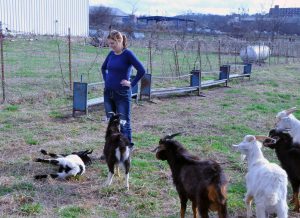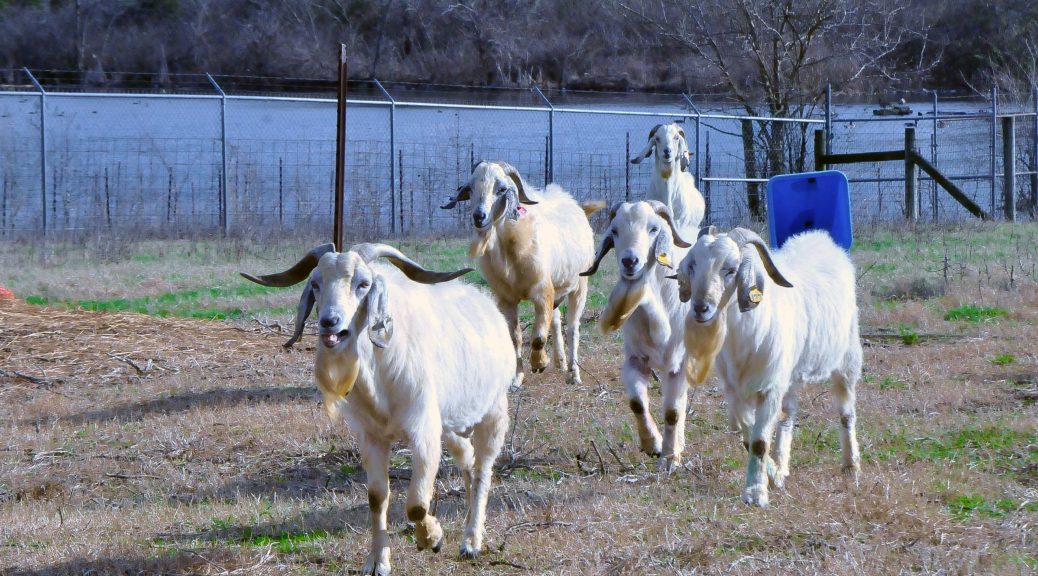NASHVILLE, Tenn. (TSU News Service) – Tennessee State University will receive nearly half a million dollars from the U.S. Department of Agriculture to expand its research on goat meat production.
 The USDA’s National Institute of Food and Agriculture on May 16 announced 47 grants totaling almost $17.5 million to improve sustainable agriculture and help rural communities thrive.
The USDA’s National Institute of Food and Agriculture on May 16 announced 47 grants totaling almost $17.5 million to improve sustainable agriculture and help rural communities thrive.
Tennessee State leads the nation in research that seeks to boost goat production in the U.S., and plans to use its $496,328 grant to enhance that research.
“We’re pleased that we’re able to get funding to continue our line of investigation on meat goat breeds and their comparative performance,” said Dr. Richard Browning, the lead goat researcher in TSU’s College of Agriculture, Human and Natural Sciences.
Nationwide, agriculture researchers say there’s a demand for goat meat because of a growing population of ethnic groups within the U.S. that consume it, not to mention an increasing number of Americans who are choosing goat over other meats, like chicken and beef, because dietitians say it’s healthier.
To meet the demand, much of the goat meat now in the U.S. is imported from other countries. But TSU’s research, which started in 2002, seeks to change that.

“I probably give 10, 12 talks a year across the country on the research,” Browning said. “We have a lot of ethnic groups that have goat as a main part of their diet, and that’s why there’s a demand for goat meat. But we don’t produce enough here.”
TSU’s research herd is comprised of approximately 250 breeding does representing diverse sets of Boer, Kiko, Spanish, Myotonic and Savanna genetics.
Browning said the latest funding from the USDA will mainly be used to study the fifth meat goat breed recently brought into the research program.
“This project is targeting the Savanna goats, which is one of the newer breeds that the industry is looking at as a possible source of improved animal performance,” Browning said.
He said the research is shared with producers, farmers, to help them be more effective in their goat production.
“The other part of this project is to train producers in the detection and management of internal parasites,” said Browning, adding that TSU will be working with goat researchers at Alabama A&M University.

Goat meat is naturally lean, meaning it is much lower in saturated fat and cholesterol, having a naturally higher HDL count (the good cholesterol) and a naturally low LDL count (the bad kind of cholesterol), according to the National Kiko Registry. It is also lower in calories than other meats, like beef, and is easier to digest.
Dr. Sandria Godwin is a family and consumer science professor at TSU, as well as a registered dietitian. She has worked with Dr. Browning to produce goat meat recipes.
“It is definitely a healthier choice,” Godwin said.
Heritage Foods USA is an online butcher based in Brooklyn, New York, that supports farmers who raise livestock, including goats. Its cuts are sold to customers in all 50 states, as well as carried in 130 restaurants from New York City to Los Angeles.
The company is an advocate for more U.S. production of goat meat.
“Goats are environmentally low-maintenance and easy to raise,” said Patrick Martins, co-founder of Heritage Foods. “Goat is actually the most widely consumed meat in the world – and America is slowly learning what the rest of the world already knows – that goat meat is delicious, lean, versatile, healthy, and sustainable.”
To learn more about Tennessee State University’s goat research, visit: http://www.tnstate.edu/faculty/rbrowning/.
Department of Media Relations
Tennessee State University
3500 John Merritt Boulevard
Nashville, Tennessee 37209
615.963.5331
About Tennessee State University
With more than 9,000 students, Tennessee State University is Nashville’s only public university, and is a comprehensive, urban, co-educational, land-grant university offering 38 undergraduate, 25 graduate and seven doctoral programs. TSU has earned a top 20 ranking for Historically Black Colleges and Universities according to U.S. News and World Report, and rated as one of the top universities in the country by Washington Monthly for social mobility, research and community service. Founded in 1912, Tennessee State University celebrated 100 years in Nashville during 2012. Visit the University online at tnstate.edu.

